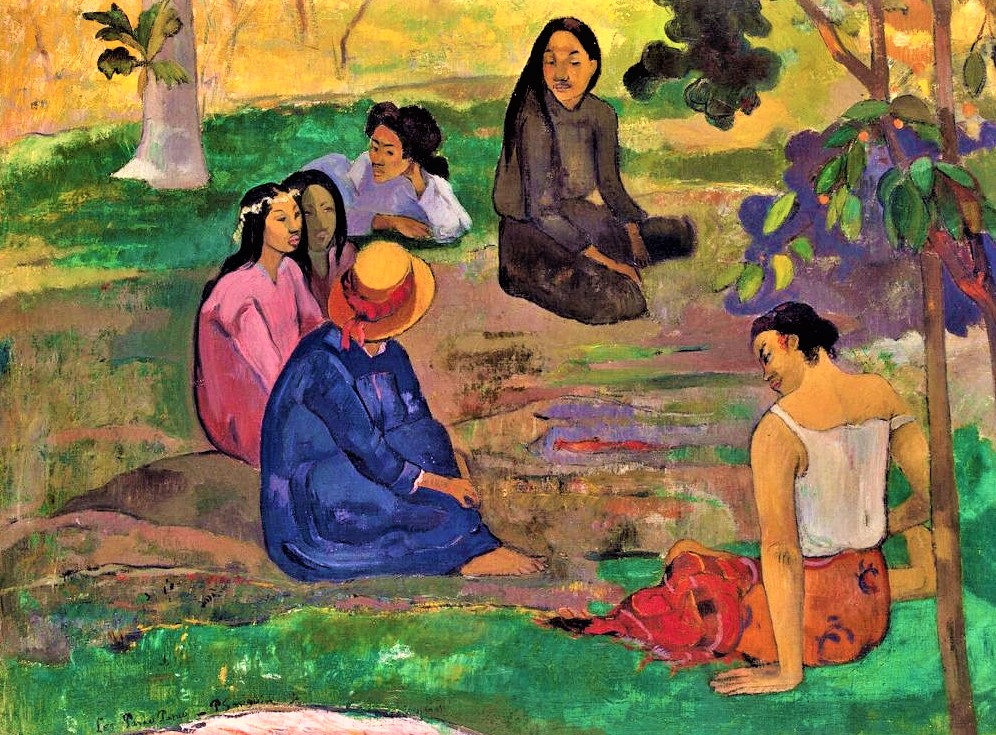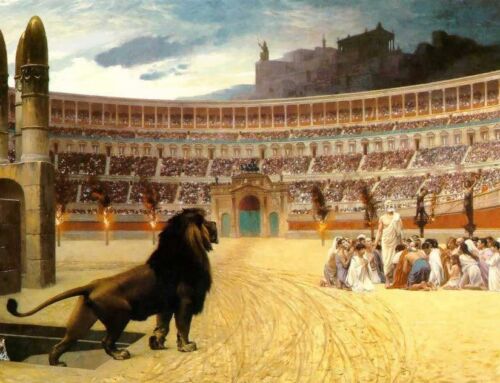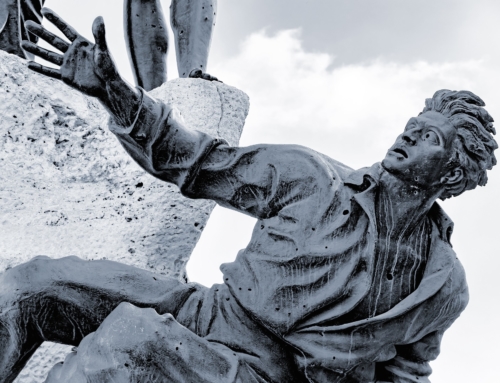When the annals of effective Christian missionaries are written, Peter Chanel will probably not be on the list – at least, not based upon the success of his missionary work during his lifetime.
The young French priest volunteered to go to Oceania and bring the Catholic faith to the Pacific islanders in need of salvation. A trading ship dropped him and a lay brother off on the tiny island of Futuna (north of Fiji), and in gratitude for his three-and-a-half years of charitable service to the natives there, the king had Chanel clubbed to death.
At the time of his martyrdom, Fr. Chanel was only thirty-eight years old and had not made a single convert to the faith. Or if he had, any gains he had made were wiped out by his death.
This is the very definition of failure.
Canonized for failure?
Peter Chanel is now a saint of the Catholic Church. Pope Pius XII canonized him in 1954. But does that mean the Church canonizes failure? Hardly. There is much more to that missionary’s life than his seemingly futile efforts.
Chanel was the fifth of eight children born to a farming family in southern France in 1803. The country was ruled by Napoleon Bonaparte at the time and was suffering the terrible aftermath of the French Revolution.
The pious child, Peter, had no human gifts that any chronicler of his life ever thought to point out. He was intelligent enough to make it through seminary and get ordained a priest at twenty-four. His nine years of priestly work in the diocese of Belley (the same diocese and time period in which St. John Vianney served) were largely unexceptional. He spent several years serving various parishes and had a failed assignment as Rector of the seminary.
A missionary at heart
The one thing that marked his priestly vocation, though, was his desire to spread the Catholic faith to those who had never received it. From a very early age he wanted to “make disciples of all nations” (Matthew 28:19), as Christ commanded, and he would have his chance.
The Pacific islands had been officially declared mission territory by Pope Gregory XVI in 1836. Peter, who was thirty-three years old by then, joined the newly formed missionary order, the Marists, and off to the Pacific he went. He was one of a group of seven men who departed on Christmas Eve that year after consecrating themselves to the Virgin Mary at a local shrine.
A new life and terrible suffering
Given the difficulties of sea travel in that era, it took Peter and his companions almost a year to arrive in the Pacific. The only problem was that they had no destination, no missionary training, no ability to speak the local languages, and virtually no support.
One of his companions died during the journey, four were dropped off on a larger island where missionary efforts were already underway. Peter and a twenty-one-year-old lay brother were then deposited on the tiny Polynesian island of Futuna (eight miles long and five miles wide), which had a tribal population of only a few hundred. To make matters worse, the people were split into two factions at the time, and they were at constant war with each other.
Imagine beginning a new life under those circumstances!
Added to Chanel’s difficulties were his slow grasp of the language, malnutrition, disease, and the pervasive immorality of the local tribesmen, which included the practice of a primitive form of abortion.
He was dependent on the local king, Niuliki, for his survival and had to contend with another factor that every missionary to a pagan nation encounters: demons. The king was the high priest of a religion that was a kind of demon-worshiping cult.
A brutal death
This fact turned out to be Peter Chanel’s undoing. After three-and-a half years of his peaceful presence among them and his self-sacrificing charity, Fr. Chanel began to win over the sentiments of the community. It looked as if the people would eventually accept Baptism, threatening the entire religious-cultural system, which had the king at the center and pinnacle of power.
The straw that broke the camel’s back was very personal. When the king’s son announced that he was going to receive Baptism from the missionary, the king had a sort of “Thomas Becket moment” (Beckett was the martyred Archbishop of Canterbury, 1172). Niuliki complained about Chanel’s evangelizing efforts in the presence of his chieftains, and, like King Edward II of England did with Beckett, insinuated that he would be glad to be rid of the meddlesome cleric.
The death blows were not long in coming. On April 28th, 1841 a small group of armed men broke into his shack and brutally clubbed Fr. Chanel to death out of hatred for the Christian faith he preached.
The priest’s lay brother companion escaped to safety and told the story to those who rescued him. It took another year for word of Chanel’s death to reach France.
Martyrdom and miracle
Perhaps it is good to pause for a brief historical note. Niuliki could have handled this situation very differently! History bears witness to many pagan kings, particularly during the Dark Ages of Europe, who not only accepted the Christian faith but did so with their entire nations.
Mighty chieftains like Clovis (of the Franks), Ethelbert (Anglo-Saxons), and Vladimir (Slavs), to name a few, became rulers of baptized, transformed peoples and lost nothing in conversion to Christianity except their futile pagan ways. In fact they gained everything, not the least of which was the salvation of their souls.
As Providence would have it, the little potentate Niuliki would not survive six months. He died of a terrible disease, and the islander who killed Peter Chanel became the new king. It was at this point that a miracle of God’s grace washed over the tiny Pacific isle.
When the original lay brother came back with two new missionary priests the following year, the whole nation asked to be baptized!
Despite some setbacks, such as disease, the new missionaries baptized the entire population of the island within a short period of time. They noted that the stated motive for baptism was always the same: Peter Chanel’s preaching and example.
A repentant king
There is a fascinating follow-up story that comes from the oral traditions of the Futunan people. A French warship brought the new missionaries to the island, and the king expected the ship to make war on him in reprisal for the death of Fr. Chanel.
But the missionaries forbade any retaliation whatsoever. The king – the murderer of Peter Chanel – was so impressed by the example of Christian forgiveness that, in time, even he accepted Baptism.
So deep was the king’s repentance and humility that, at the end of his life, he asked to be buried immediately in front of the shrine to Fr. Chanel so that visitors would walk over his grave when they paid the martyr their respects.
By their fruits you will know them
After learning the story of Peter Chanel, I’m sure you will agree with me that his name would deserve a special place in “the annals of effective missionaries”, not because of what he accomplished in his lifetime but for the spiritual fruits that came afterward. The Church’s definition of “success” is not the same as the world’s.
In the logic of the Kingdom of God, success is found not always in extraordinary human acts but primarily in the fruits of virtue, and sometimes even in death. We are told by Christ Himself: “Amen, amen, I say to you, unless a grain of wheat falls to the ground and dies, it remains just a grain of wheat; but if it dies, it produces much fruit” (John 12:24).
This dynamic is a spiritual law, not a worldly expectation of outcomes. It always flows out of the same eternal truth: death produces life for those with faith. Christ’s Cross is the Tree of Life. From seeming failure, in human terms, comes spiritual success, provided that Christ is the motive and the basis of all human efforts.
Our title question – “Was St. Peter Chanel’s mission a total failure?” – has a distinct answer, but that answer depends on whether you look at his mission with the eyes of faith or the eyes of the world.

Soul Work
I cannot personally imagine living for years as a missionary among a foreign people on a strange Pacific island with no success in my work and then ending in a violent death. I have not been called to that kind of mission, or that kind of sacrifice.
But I have innumerable sacrifices to offer in the mission God has given me, and those are the things that will bear fruit if I do them for the proper motive and with as much virtue as I can muster.
Every challenge, suffering and silent martyrdom demanded by our state in life can be turned into a pleasing sacrifice to God if we offer them as a participation in the Cross of Christ. There is nothing such as a fruitless act or intention in the life of a Christian. The only wasted acts are those devoid of Christ and virtue.
Do you experience a sense of failure or just plain fruitlessness in your work? Ask yourself if you are doing everything for the right motive and in the proper spirit? If so, all your frustrations can be transformed into sacrifices.
Be not discouraged by any difficulty. Remember the words of Our Lord: “Whoever remains in me and I in him will bear much fruit, because without me you can do nothing” (John 15:4-5).
——-
Source: Website dedicated to St. Peter Chanel.




This is an awe inspiring story of missionary zeal.
The beginning of the story has thirty-three year old Farther Chanel’s arriving at a tiny pacific island with an indigenous population of only a few hundred, which are already split into two warring factions. He converted some of them, which angered the chief who let out word that he wants to be rid of this meddlesome priest. And a tribesman clubs Father Chanel to death when he was only38.
What a sad ending to the first part of Fr. Channel’s life.
But there’s always part two: his life in eternity. Being martyred, Father Chanel probably went straight to heaven to be reunited with his family members, ancestors, and early converts of his flock who might have predeceased him.
Today he is reunited with all the tribesmen on the island, even the chief who wanted him dead. And Father Chanel is their link to the much larger congregation of billions of saved who are united to Jesus Christ.
It must be wonderful to be in heaven where no tear is shed, no suffering permitted, where everybody basks in the unlimited joy and euphoria of finally being with God forever, and everybody has a share in it.
Maurice A. Williams
I have read much about the Jesuit missionaries in Canada and I made business trips to Montreal. What Fr. Charnel did fits right in with what the Jesuits I Canada did.
Hi Maurice, I agree that this is truly an amazing story. I found the conversion of his killer to be the most extraordinary fruit of his sufferings. I also love the story of the North American martyrs – who knows, you may see an article on these Jesuits some day soon haha. Incidentally, the NA Martyrs’ feast day is tomorrow, Oct 19. Peter D.